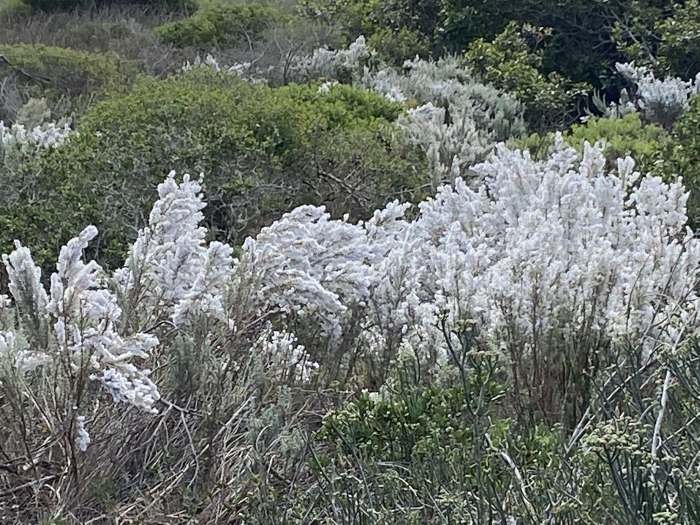Kapokbos
(Eriocephalus racemosus)
Kapokbos (Eriocephalus racemosus)
/
/

© Christina
CC BY 4.0
Image By:
© Christina
Recorded By:
Copyright:
CC BY 4.0
Copyright Notice:
Photo by: © Christina | License Type: CC BY 4.0 | License URL: http://creativecommons.org/licenses/by/4.0/ | Uploader: stilbaai_herbarium | Publisher: iNaturalist |

























Estimated Native Range
Summary
Eriocephalus racemosus, commonly known as kapokbos or snow bush, is a perennial shrub native to the fynbos and renosterveld vegetation types within the Cape Floristic Region, particularly in the Western Cape of South Africa. It thrives in sandy, well-drained soils and is adapted to a Mediterranean climate with wet winters and dry summers. This species typically grows to a height of 0.5 to 1 meter and has a similar spread. Kapokbos features fine, needle-like leaves and bears small, white, fluffy flowers that resemble snow, hence the common name "snow bush." The flowering season is mainly in the winter and spring months, and the flowers are quite showy, attracting pollinators.
Kapokbos is valued for its drought tolerance and is often used in water-wise gardens. Its aromatic foliage and attractive flowers make it suitable for ornamental use in rockeries, as a border plant, or in mixed shrub plantings. It requires minimal maintenance once established. In cultivation, kapokbos prefers full sun and can tolerate poor soil conditions, provided they are well-drained. It is not known for having aggressive roots or being particularly prone to diseases, making it a hardy choice for gardeners. Additionally, Eriocephalus racemosus has traditional medicinal uses, including the treatment of colds and as a diaphoretic and diuretic.CC BY-SA 4.0
Kapokbos is valued for its drought tolerance and is often used in water-wise gardens. Its aromatic foliage and attractive flowers make it suitable for ornamental use in rockeries, as a border plant, or in mixed shrub plantings. It requires minimal maintenance once established. In cultivation, kapokbos prefers full sun and can tolerate poor soil conditions, provided they are well-drained. It is not known for having aggressive roots or being particularly prone to diseases, making it a hardy choice for gardeners. Additionally, Eriocephalus racemosus has traditional medicinal uses, including the treatment of colds and as a diaphoretic and diuretic.CC BY-SA 4.0
Plant Description
- Plant Type: Shrub
- Height: 3-5 feet
- Width: 3-5 feet
- Growth Rate: Moderate
- Flower Color: White
- Flowering Season: Spring, Summer
- Leaf Retention: Evergreen
Growth Requirements
- Sun: Full Sun
- Water: Low, Medium
- Drainage: Medium, Fast
Common Uses
Bee Garden, Drought Tolerant, Fragrant, Low Maintenance
Natural Habitat
Native to fynbos and renosterveld vegetation types within the Cape Floristic Region
Other Names
Common Names: Wild Rosemary
Scientific Names: , Eriocephalus racemosus, Eriocephalus affinis, Eriocephalus simplicifolius, Eriocephalus spicatus, Eriocephalus spicatus,
GBIF Accepted Name: